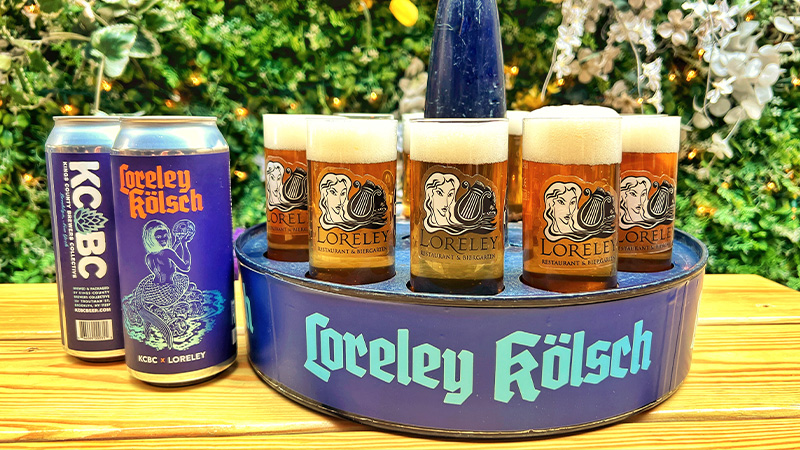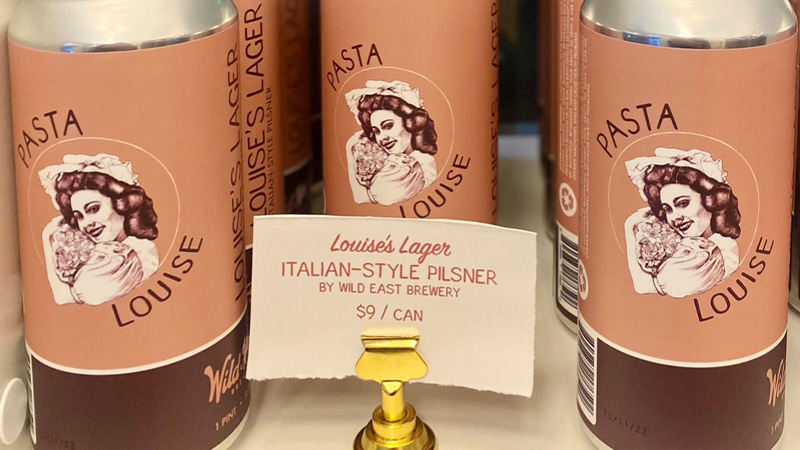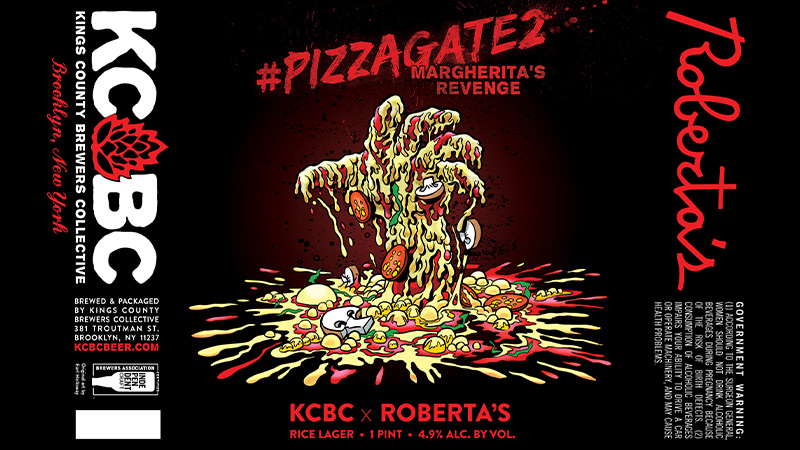The house beer at Manhattan’s Loreley Beer Garden clues one into where the restaurant’s owners are from. Their Kölsch-style beer made by Brooklyn’s KCBC (Kings County Brewers Collective) is a nod to their roots in Köln, Germany, where the beer style originates. Sure, imported Kölsch is readily available — some are even served at Loreley — but Kölsch is a beer style best served incredibly fresh, which means it’s preferable if it’s made nearby. KCBC happily shortens the geographical gap from Köln, making a beer specifically, and only, for Loreley.
Though house beers are nothing new, historically, they’ve often been disappointing. Sometimes they’re an existing brand packaged with a different label. Often, they attempt to please a wide audience by making a nondescript, inoffensive beer that inevitably turns out ho-hum. However, several restaurants in New York City like Loreley have found that partnering with local breweries to offer something unique and organic as opposed to forced and trite can create a house beer of genuine interest for both restaurant patrons and beer nerds.
Brand Awareness and Marketing
Instead of being cagey about the identity of the partnering brewery, as was typical in the past, that information is now often proudly displayed on menus around town. In these new arrangements, it’s a nonstarter for many small breweries.
“It’s a stipulation … I gain nothing from white labeling unless I can find a way to make it really high- margin,” says Brett Taylor, co-founder and head of brewing at Wild East Brewing in Brooklyn. This also helps gain trust from customers that there’s a legitimate brewery making the beer — perhaps one they already know and love. In the cases where they don’t already know the brewery, it’s a great marketing opportunity. “It puts our beer in front of a clientele who may not even know we exist,” Taylor says.
Similarly, KCBC’s co-founder Zack Kinney says, “We have one storefront and if we can have another opportunity to do something a little different for someone who at least thinks the same way. … It just seems like an obvious way to continue to have fun, be creative, and hopefully profitable.”
Opportunities for Niche Offerings
Wild East has been making an Irish Red Ale for The WolfHound over in Astoria. The self-described “contemporary Irish pub” has Guinness, of course, but Irish Red Ale can be more approachable and is more versatile with food. With few Red Ale options on the market, having a local partnership is ideal for the restaurant.

Another pub, the Jones Wood Foundry on the Upper East Side, has a cask ale house beer. Like Kölsch, this traditional British beer style also presents itself best when fresh, and employs a unique serving method that requires a skill set many don’t have. Given that, it’s hard to find consistent resources to keep this kind of beer flowing. Jones Wood Foundry meets this challenge by partnering with Seneca Lake Brewing, an expert in cask beer that has agreed to regularly provide a traditional British-style ale in casks. This makes the restaurant one of only a handful of places in the entire city where cask ale can dependably be found.
Roberta’s Pizza has a constant rotation of house beers made by breweries like KCBC, Threes Brewing, and Interboro. For regulars, the opportunity to try a new beer on each visit only adds to the appeal of the restaurant.
Though there’s no shortage of pilsners or IPAs in the city, Roberta’s, with several locations around town, has found a benefit to having its own beer, and that’s often what they have made for them. To help the beers stand out, Kinney encourages KCBC’s partners to provide detailed information about their house beer so customers understand it’s special, and not like other IPAs or pilsners available on the market, or even available via KCBC.
“Having a small business in Brooklyn and knowing how hard it is … there’s that feeling of camaraderie.”
It’s hard to shake the current dominance of IPAs, so that’s an obvious choice for restaurants. But pilsner has dominated the beer world for much longer and can work incredibly well with food as it’s a refreshing and palate-cleansing style. For Roberta’s, it offers a nice contrast to cheese-heavy pies. (No wonder most Italians enjoy pizza with a cold Peroni.) But other beers can work with pizza, too. And occasionally the pizzeria has other styles like ESB (extra special bitter).

Brooklyn’s Pasta Louise also wanted a pilsner with a special touch available for its customers only. The Brooklyn eatery with two locations carried Wild East’s beers in its early days, particularly the brewery’s Italian-style pilsner, Moda.
Pasta Louise worked with Wild East to create a spin on that, calling it “Louise’s Lager.” It’s essentially Moda with an extra addition of hops. Production-wise, it works well for the brewery, which can pull from a batch that’s already in progress to produce the custom beer. Pasta Louise owner Allison Arevalo says the beer sells really well. “Customers know it has our seal of approval,” she says.
Collaborative Over Transactional Partnerships
Arevalo finds establishing partnerships with nearby small businesses is not just financially beneficial. “Having a small business in Brooklyn and knowing how hard it is … there’s that feeling of camaraderie,” she says.
It seems clear the ability to establish a relationship before the creation of a house beer is a key factor in the success of the latest iteration of house beers. “Most of the time, it’s a customer we’ve been working with for a while,” KCBC’s Kinney says. If a restaurant approaches his brewery and they don’t have a relationship already, KCBC will ask them to start by selling existing brands. If that goes well, the brewery is more than happy to talk about creating a special house beer, complete with custom artwork using the in-house design team KCBC is known for.

Arevalo hopes to find other avenues to make the partnership with Wild East even more beneficial. When asked if she thinks they will continue to make Louise’s Lager, she says, “if anything, I think we’ll find other ways to further our relationship with Wild East. Maybe doing pop-ups at the brewery.” And Pasta Louise is open to working with other breweries, too.
Though the production of Louise’s Lager works well for Wild East as it’s a tweak on a beer already produced regularly, the same is not true of the Irish Red Ale made for The WolfHound. Unfortunately, that partnership will be coming to an end. Though the beer was excellent, and both parties maintain a good relationship, long-term, the production doesn’t make sense for Wild East’s operation. However, WolfHound patrons will have another Irish Red on tap without missing a beat: Destination Unknown Beer Company (DubCo) will continue the tradition for the Astoria pub.
This latest iteration of house beers has proven successful because they’re not a novelty and they genuinely elevate guests’ experiences. Part of the success has been the ability to be flexible and having a real partnership with like-minded, neighboring businesses. Though the specific beers or partners may change over time, it seems the modern house beer format is here to stay for another round.